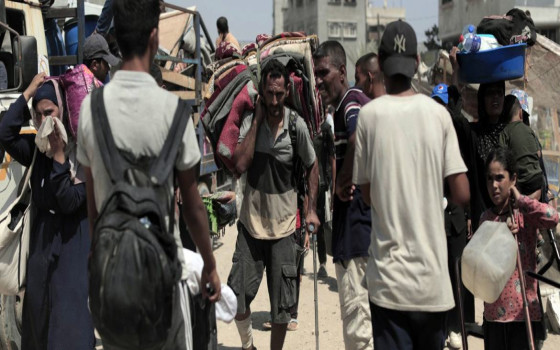
Two explosions near the Israeli embassy in the Danish capital.. Tehran says: The Security Council's inaction left us no other choice.. and the British Prime Minister confirms commitment to Israel's security

- Europe and Arabs
- Wednesday , 2 October 2024 6:26 AM GMT
Capitals: Agencies
The Danish police said on Wednesday that they are investigating two explosions that occurred near the Israeli embassy in Copenhagen.
The police added, in a statement, that they are being investigated, noting that there are no reports of injuries from the explosions.
This comes as Israel launched a "limited" ground incursion into southern Lebanon, and tensions escalated with Iran's bombardment of Israel with hundreds of missiles, in response to Israeli assassinations.
Cairo News Channel quoted Iranian media outlets as saying that Iranian President Masoud Pezeshkian confirmed that the missile attack launched by Iran on Israel is part of Tehran's capabilities.
The Iranian president warned Israel against engaging in a confrontation with Iran at the present time. He stressed that responding to Israel is a legitimate right and aims to achieve peace and security for Iran.
The Iranian mission to the United Nations said that the inaction of the UN Security Council and its failure to prevent Israel from violating the basic principles of international law left Tehran with no choice but to defend its interests.
In a letter addressed by Iran's Permanent Representative to the United Nations, Amir Saeed Iravani, to the President of the UN Security Council and the UN Secretary-General, it stated: "It is regrettable that the UN Security Council has failed to fulfill its primary responsibility to maintain international peace and security, and has allowed Israel to blatantly cross all red lines and violate the basic principles of international law."
The mission stressed that the Security Council's inaction "left Iran no choice but to exercise its legal right to protect its interests."
The Iranian mission had previously confirmed in a statement that the Iranian response to the terrorist acts committed by the Zionist regime is legal and rational.
Iranian Leader Ali Khamenei warned in a tweet published in Hebrew on his account on the "X" platform that the strikes against Israel will become "stronger and more painful."
Iranian President Masoud Pezeshkian also stressed that the missile attack on Israel was in defense of the interests of Iran and its citizens.
The Israeli army announced on Tuesday evening that Iran had fired hundreds of missiles towards Israel.
The army spokesman asked Israelis to remain alert and follow the instructions of the Home Front Command carefully.
Meanwhile, the Revolutionary Guards announced the launch of dozens of missiles towards Israel and warned that Tel Aviv's response would be met with a "more crushing and destructive" response from Tehran.
A senior Iranian official told Reuters that the missile launch came on the orders of Supreme Leader Ayatollah Ali Khamenei, who has remained in a safe place since the Israeli air strikes on Beirut that killed Nasrallah last week.
Israel closed its airspace following the Iranian attack, and Israeli officials said that this attack "will have consequences" and threatened Tehran with a violent response.
An Israeli security source stated that Tel Aviv will attack Iran intensively tonight in response to targeting it with missiles.
Israeli Prime Minister Benjamin Netanyahu said late on Tuesday that Iran had made a big mistake and would pay the price for it.
British Prime Minister Keir Starmer confirmed in a call with his Israeli counterpart Benjamin Netanyahu Britain's "steadfast commitment" to Israel's security in the wake of the Iranian missile strike.
The spokesman for the British Prime Minister's Office said on Tuesday that the two sides discussed the escalation in the Middle East, and that Starmer condemned the Iranian attack on Israel "in the strongest terms."
"This is intolerable," Starmer later told reporters, adding: "We stand with Israel and recognise its right to defend itself against this aggression. Iran must stop these attacks."
The British prime minister declined to answer a question about whether Britain was prepared to use its armed forces to help Israel, saying that "any update on this will be provided in due course."
For his part, British Foreign Secretary David Lammy warned Iran in a post on the social networking site "X" against "taking any actions that would push the region towards the abyss," adding that "a series of escalations is in no one's interests."
It is worth noting that Iran launched a large-scale missile strike on Israel on Tuesday evening in response to the assassination of the Secretary-General of the Lebanese "Hezbollah" Hassan Nasrallah on September 27.
Israel announced following the attack that Iran "made a mistake" and threatened to respond soon.












No Comments Found